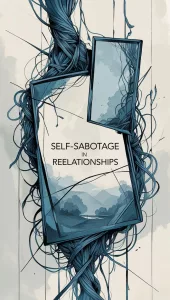Ever feel like you’re in a great relationship, then suddenly you start ghosting, picking random fights, or doubting your partner for no real reason?
Yep—welcome to the weird world of self-sabotage.
You’re not trying to ruin things on purpose. It’s just your brain pulling emergency brakes it doesn’t need to.
This sneaky habit often comes from old wounds, fears of being hurt, or thinking you’re not worthy of love (spoiler: you are).
It’s like wanting a rom-com ending but always flipping to the drama channel.
In this post, we’ll break down why we do this, what it looks like, and how to stop it—so you can actually enjoy the healthy, loving connection you keep pushing away.
What Does Self-Sabotage Look Like in Relationships?
Self-sabotage isn’t always some big dramatic explosion.
Most of the time, it’s quiet. Sneaky.
You might not even know you’re doing it until you’re watching your favorite rom-com and thinking, “Ugh, that kind of love isn’t real.” (Hint: It can be. If you stop hitting your own relationship kill switch.)
Let’s break down the typical ways people self-sabotage — no sugarcoating, just real talk.
1. You push people away
Things start getting close. You panic. Suddenly, you’re more ghost than partner.
- Start a fight over nothing: Your partner says something harmless like “Let’s cook dinner together,” and you snap like they asked for a kidney.
- You shut down emotionally: One minute you’re laughing, the next you’ve built a wall taller than the one in Game of Thrones. You go cold.
- You test them: You poke. You push. You act difficult to “see if they’ll stay.” It’s like you’re trying to audition them for a reality show called Are You Sure You Want Me?
- You dip without a word: AKA ghosting or slowly fading into “sorry I’ve just been busy” land. You vanish when things get real.
2. You doubt the relationship for no real reason
Everything’s good… so you start hunting for something wrong.
- You overthink everything: You’re convinced there’s a red flag somewhere, so you search like it’s a treasure hunt. You find stuff that’s not even there.
- You compare to chaos: You miss the drama of your toxic ex, so this healthy thing feels “meh.” Plot twist: Peace isn’t boring. It’s healthy.
- You brush off affection: They compliment you. Say something sweet. You laugh it off or ignore it. You don’t believe they mean it—because you don’t believe it.
3. You look for validation outside
Commitment feels too real, so you start looking elsewhere for attention (without even meaning to cheat).
- Flirting/seeking attention from others: That flirty DM? That “just friends” vibe? You’re chasing a quick hit of “I’m still wanted” without thinking about the damage.
- You stay too busy: Every hour is packed with work, friends, errands, or three-hour gym sessions. You tell yourself you’re productive, but you’re just dodging closeness.
- Excessive social media use: You’re deep in other people’s highlight reels, comparing your relationship to curated couple goals. You seek more attention online.
4. You make your worst fears come true
This is the ultimate sabotage move. You believe something bad about love, then act in ways that make it real.
- “I’m not lovable”: So you act unlovable. Distant. Hard to reach. Then, when your partner leaves, it’s like, “See? Told you.”
- “Relationships never last”: You pick fights, shut down, pull away… and yeah, eventually, it ends. Self-fulfilling prophecy is complete.
- “I’ll end up alone”: You never fully commit. You always keep one foot out the door. You sabotage before they can “hurt you first.”
The Hidden Roots: Why Do We Self-Sabotage?
Knowing what you’re doing is step one. But figuring out why you’re doing it? That’s the game-changer.
Most self-sabotage isn’t about being mean or careless. It’s about trying to stay safe—even if the “safety” is actually messing up your chances at real love.
Let’s dig into the real reasons people hit the relationship self-destruct button.
1. You’re scared of getting too close
Being real with someone feels risky. So your brain goes, “Nope, not doing this again.”
- You’ve been hurt before: Maybe someone cheated, ghosted, or totally broke your trust. Now your brain thinks closeness = danger.
- You fear rejection: Getting close means they could leave. So you bail first. It’s like quitting a game before you lose.
2. You don’t think you deserve a good thing
If deep down you feel unworthy, you’ll act like love is some kind of scam.
- “I’m Not Good Enough” vibes: You might tell yourself, “They’ll leave anyway” or “This is too good for me.” So you wreck it before they can “find out” who you really are.
- Hiding your real self: You push people away because you’re afraid they’ll see your flaws and bounce. This usually comes from growing up without steady support.
3. Attachment Styles
How were your caregivers treated you as a kid? Yeah… that can follow you into your DMs and date nights.
- Anxious attachment: You get close fast, but then you panic they’ll leave. So you cling, overthink, and wear yourself out trying to keep them around.
- Avoidant attachment: You freak out when someone wants emotional intimacy. So you distance yourself and say, “I need space,” when really, you need connection.
4. You’re addicted to chaos
Peace and stability? Kinda boring if you’ve only known drama.
- Comfort in dysfunction: If every past relationship was like a telenovela, then something calm might feel “off.” You might even stir up problems just to feel “normal.”
- Replaying old scripts: You keep picking partners or repeating patterns that match your old wounds. Why? Your brain’s trying to rewrite the past.
5. You want perfection or nothing
You’ve got a highlight-reel idea of love in your head. Real life doesn’t measure up, so you bail.
- You expect flawless: The second your partner shows a flaw—boom. You start pulling away or looking elsewhere.
- You think mistakes mean doom: One fight? One misstep? You’re out. Because if it’s not 100%, it must be doomed… right? (Wrong. Relationships are messy. That’s normal.)
Breaking the Cycle: Strategies to Overcome Self-Sabotage
Let’s be real: self-sabotage isn’t something you’re stuck with forever.
You learned it somewhere, which means you can unlearn it. It’s not magic. It’s work.
But it’s doable. Here’s how to start breaking the cycle.
1. Start with radical self-awareness
You can’t fix what you don’t see. So step one: call yourself out. Gently. But clearly.
- Keep a journal: Not some perfect diary—just jot down moments when you feel off. Ask: “What was I feeling right before I snapped or shut down?”
- Spot your triggers: Does your drama mode kick in when someone gets too close? When they say “I love you”? When they don’t text back for 3 hours?
- Try mindfulness: Mindfulness isn’t just for yoga influencers. It’s about noticing your thoughts without acting on them. When your brain screams RUN!, take a breath.
2. Look back so you can move forward
Self-sabotage often comes from old pain. You don’t need to relive it—but you do need to understand it.
- Try therapy: A good therapist can help you figure out where your patterns came from. CBT? Great for flipping negative thoughts. Attachment therapy? Great for fixing messy love habits.
- Do inner child work: Yep, sounds woo-woo—but it’s legit. A lot of sabotage comes from your younger self not getting what they needed.
- Question the BS: Thoughts like “I’m not lovable” or “All relationships fail” aren’t facts. They’re scripts. Time to rewrite them.
3. Practice being vulnerable
Vulnerability sounds scary—but it’s just being honest without the armor.
- Start small: Share something light but real. A fear. A past fail. Something that makes you human. See how your partner reacts (spoiler: they probably won’t run).
- Stay with the discomfort: When you want to ghost or start drama, pause. Say: “I’m feeling anxious right now.” Name it. Don’t act it out.
- Talk about it: If it feels safe, tell your partner what’s up. Like, “Sometimes I sabotage things when they get real. I’m working on it.” Vulnerability builds trust.
4. Build better coping skills
Don’t just shut down when you feel overwhelmed. Do something else instead.
- Manage stress: Walk. Breathe. Dance to Beyoncé. Do something that calms your body when your mind spirals.
- Regulate your emotions: Instead of reacting to big feelings, try naming them. Say: “I feel jealous.” or “I’m scared of being hurt.” Write it down if talking’s too hard.
- Set boundaries: Learn to say “no” when you mean it. Or “I need a minute.” Boundaries keep things respectful and stop resentment from building.
5. Ditch the perfect relationship myth
You don’t need a fairytale. You need something real—and that includes mess.
- Accept flaws: No one’s perfect. Not you. Not them. That one argument? Not a dealbreaker. It’s normal.
- Choose growth over perfection: If something feels hard, ask: “What can we learn from this?” instead of “Should I leave?”
- Celebrate progress: Did you stay open instead of shutting down? Win. Did you name a feeling instead of bottling it? Big win. Track the good stuff—it counts.
6. Be kinder to yourself
You’re doing the work. That matters.
- Let go of guilt: So you’ve sabotaged before. Cool. You were doing the best you could with what you had. Now you’re learning.
- Give yourself time: You’ll mess up again. That’s part of it. Just keep going. Healing isn’t linear—it’s more like your favorite messy playlist.
Final Thoughts: You Can Break the Pattern
Self-sabotage doesn’t mean you’re broken. It just means you’ve been protecting yourself in the only way you knew how. But now, you know better.
Start small: notice your patterns, get honest about your fears, be a little braver with your heart, and pick better ways to cope. This isn’t just about fixing love—it’s about healing you.
You’re allowed to have a healthy, real connection. You just have to stop blocking it.











Leave a Reply